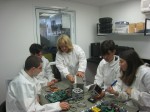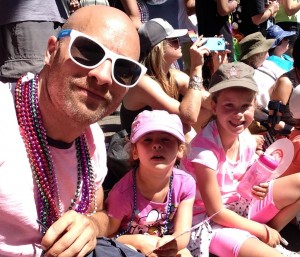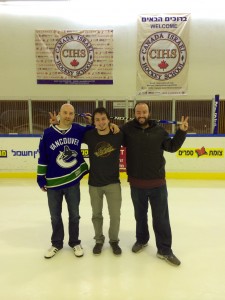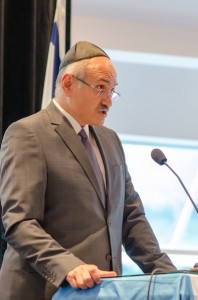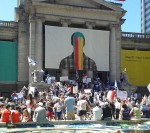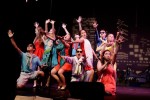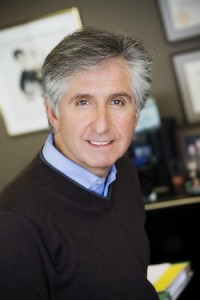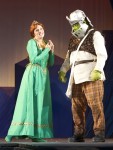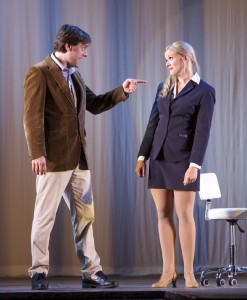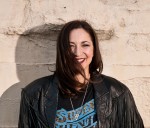A group of Herzliya Science Centre students working on Duchifat 1 in the clean room with Dr. Ana Heller. (photo from Herzliya Science Centre)
In Israel, high school students helped launch a satellite into space – something typically reserved for university students.
“The Herzliya Science Centre (HSC) is the science campus for Herzliya’s middle and high schools,” explained Dr. Meir Ariel, the director general of the centre, which opened in 2007.
Some 1,500 students attend HSC advanced labs, studying and experimenting in physics, chemistry, electronics, biotechnology, computer science and robotics. “The jewel of the crown is our space and satellite lab, the only lab in Israel where high school students can design and build satellites and send them into space,” said Ariel.
This lab is attended by 40-50 of the brightest, most dedicated students from various schools in Herzliya and beyond.
“Duchifat 1, the first Israeli nano-satellite, weighing less than one kilogram, required multidisciplinary knowledge – from electronics to software, communications, thermodynamics and astrophysics – to construct,” he said.
Students wanting to participate began in Grade 9, with a two-year training period that provided the basic scientific knowledge needed to become candidates for membership in the space and satellite lab.
“Teenagers aren’t intimidated by technology and have little fear of failure,” said Ariel. “The success of the team relies on the ability of its members to be creative, innovative, disciplined and, most importantly, highly motivated.”
Collaboration with the Israel Aerospace Industry was crucial for the project’s success. Each team was led by an experienced engineer. Students not only learned from their mentors, but they were also exposed to state-of-the-art technology, tools and developmental procedures.
“Duchifat 1 served as a pedagogical platform, allowing high school kids from all over Israel to communicate, send commands, receive telemetry and experiment with a real satellite,” said Ariel. “Its other mission was search and rescue from space via its APRS transponder.”
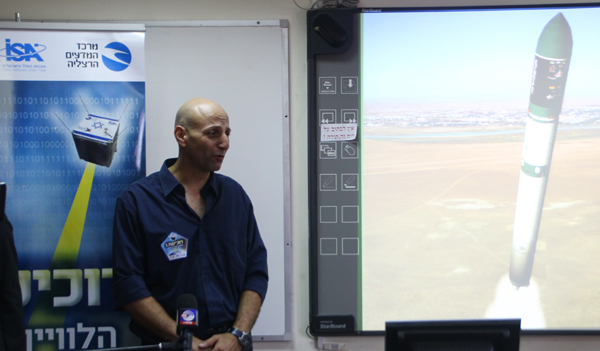
Duchifat 1 was successfully launched into space aboard the Dnepr launcher a couple of months ago, on June 19.
“To reduce costs, Duchifat 1 was actually a ‘hitchhiker’ aboard a rocket that carried bigger satellites into the same orbit,” said Ariel. “Since then, Duchifat 1 has been orbiting around earth and is being tracked from the ground station at HSC by the same high school students who built it.”
Shenhav Lazarovich, 19, was one of the students who helped build Duchifat 1. She heard about the opportunity during an open day at Handasaim Herzliya High School, when learning about HSC.
“The first meeting with Dr. Anna Heller was something I won’t forget,” said Lazarovich. “She entered the room and said she’s leading a project with a goal to build a Pico satellite that will be totally designed and programmed by high school students. In that moment, I decided I want to be one of the team.”
Lazarovich had two major responsibilities in building Duchifat 1 – buying and upgrading the lab equipment (including satellite parts) and serving as the programming team’s EPS (electronic power system) programmer.
The other student on Lazarovich’s team was Ori Opher, who was responsible for finding solutions to various battery-related problems, like low battery discharge time and battery thermal issues.
“The battery is the heart of the satellite and needs to work at its best to fulfil the main goal of the satellite – saving lives (as an SOS signal transmitter),” said Lazarovich.
The satellite was launched by Dnepr 1, a Russian missile converted for space launching use. At this launch, it had 37 satellites from countries around the world.

“It was an amazing experience,” said Lazarovich. “We gathered around with 37 teams all over the world and watched how our ‘baby’ made its way to fulfil its destiny. Anna [Dr. Heller] has been working on this project for more than 10 years and I was there for the last four.
“When we got signals from space, all of us started crying and laughing. We’re one of the first teams to receive satellites signals from space, not to mention the youngest team in the launching program. The excitement, the energy, is something I can’t describe with words.”
Yarden Carmel, 17, decided to take part in the Duchifat 1 project about three years ago, after switching to a different high school, where one of the mandatory classes was Satellites and Space.
“We were having our guided tour and, in one of the stops, they had Dr. Anna Heller, the project lead, talking about the project,” said Carmel. “She said something I’ll always remember, that she ‘isn’t looking for mathematicians or science geniuses, but for students with fire in their eyes.’”
Carmel and his team worked on the memory management of the satellite. “Duchifat 1 got some kilobytes flash memory, like those used in the portable flash drives, but with much less memory capacity,” he said. “Our mission was to find an algorithm that would hold the information the satellites generate (like life status) and receive (like stress signals from earth) for the longest time without being overwritten by new information.
“It had to be enough time for it to be able to fly above our ground station in Israel, so we could download all the data. It might sound easy, but remember we’re dealing with much less memory capacity than in a normal PC or a Mac. We have less than one megabyte to work with and it took us a few times to get the best algorithm.”
Carmel, who also will help build Duchifat 2, still recalls being rendered speechless when seeing the live footage of the missile going up. “It even rocked the HQ building we were in,” he said. “We were all either crying with happiness, staying stressed and silent, or just repeating, ‘Here’s Duchifat!’ and ‘We made history!’”
Duchifat 2 is one of a network of 50 miniature satellites built by university teams all over the world. “The satellites will be launched in 2016, with a mission to perform atmospheric research within the lower atmosphere (between 200 and 380 kilometres altitude), which is the least explored layer of the atmosphere,” said Ariel. “Duchifat 2 is the only satellite in this network built by high school students. All [the] other 49 satellites were built by universities.”
“During these difficult times in Israel,” said Lazarovich. “I’ve wanted to say that the key for a better future is science and education. Combining these on both sides will result only in good to the whole region and the entire world. Science is an endless source for development and making the world a better place.
“When adults are asked to do a big task, they always think about why it’s not possible to do [so].… When children [are] asked to do a big task, they just do it. They don’t see the limits that adults do. And, even if they do, they are not afraid to just try it anyway.”
The launch video, and other Duchifat 1 videos, can be seen on YouTube.
Rebeca Kuropatwa is a Winnipeg freelance writer.

